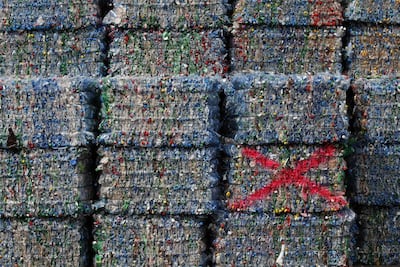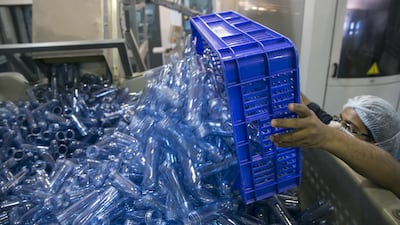The UAE has tapped into the billion-dollar market of plastics with the launch of the first global trading platform for recycled materials.
Rebound Plastic Exchange was launched on Monday and already has traders from around the globe signing in to buy recycled materials in a market that is expected to exceed $46 billion by 2025.
Plastic pollution is one of the biggest threats the world is facing today.
Thousands of marine animals are killed each year by ingesting plastic or getting tangled in it.
Plastic also has a direct impact on our health with the release of toxic substances into the soil and the air. This happens when plastic bags degrade in direct sunlight or are burnt.
Reducing plastic pollution
But it isn’t plastic that it is bad, it is how it is managed, according to Maryam Al Mansoori, Rebound’s chief executive.
“Plastic pollution is now visible more than any environmental threat that we face. And so when you ask what Rebound does, Rebound aims to be part of the solution to reducing plastic pollution.”
Organisations in the Middle East, North America, Latin America, India, South-east Asia and Europe have already subscribed to the Rebound Plastic Exchange.
“We are providing a marketplace that enables buyers and sellers of plastics to be encouraged to capture, recycle, process the plastics and make financial returns. So everyone that's involved in the recycling industry benefits, whether they run recovery facilities or whether they want to incorporate plastics and have their own commitments as big brands,” she said.

Growing sector
The recycled plastic trade market is expected to grow exponentially in the coming years with international companies heading towards using more recyclable material, whether it is for their products or for packaging and labelling them.
Ms Al Mansoori stresses that plastic is not going anywhere anytime soon.
“It's a versatile and useful material — we have to emphasise the fact that plastic is not the bad person in the room,” she said.
“It's the way that we manage our waste that unfortunately is leading to environmental leakages and landfills, and oceans that by 2050 are expected to have more plastics than fish.”
Of the seven billion tonnes of plastic waste generated globally so far, less than 10 per cent has been recycled.
Rebound will connect buyers and sellers from around the world ensuring throughout that the plastic traded, whether in small pellet form or large compressed bales, has passed quality checks.
The trade is confidential and contributes to what is described as a circular economy, where materials are continuously reused and not left to go to waste.
Rebound ensures that the plastic's value is kept in the economy rather than leaking into the environment, damaging the health of marine life and animals.
Recycled plastic can be used to make a various items, including T-shirts, shoes, bottles, labels and more.
Prof Edward Kosior is managing director of Nextek and a technical expert leading the development of material specification sheets for Rebound.
“Unless current practices change, it is estimated that 108 million tonnes of plastic waste will be landfilled, dumped, or openly burnt in 2050, especially in underdeveloped and developing countries,” said Prof Kosior.
“There is clearly a growing imperative for plastic circularity, and with the increasing demand for high-quality recycled plastic feedstock, the key trading factors of quality, standardisation, transparency, and trust are paramount.
“We are leading the movement beyond an era of informal, closed-door material trading, and towards a more integrated, efficient, and quality-assured system.”
Plastic pollution is a pressing matter for governments to address. In 2023, the UAE will host the Cop28 climate conference at Dubai Expo City where global leaders and policymakers will convene to find solutions to threats posed by climate change.














